| SHADOWS ON THE WALL | REVIEWS | NEWS | FESTIVAL | AWARDS | Q&A | ABOUT | TALKBACK | |||||
 Shadows off the beaten path Shadows off the beaten pathIndies, foreign, docs and shorts...
On this page:
BEING THUNDER |
THE CRIME OF THE CENTURY |
HATING PETER TATCHELL
| |||||
| See also: SHADOWS FILM FESTIVAL | Last update 4.Jun.21 | |||||
|
Being Thunder Review by Rich Cline | 
| |||||
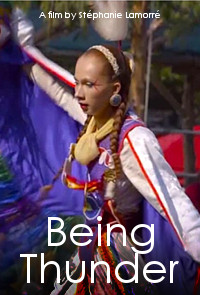 dir Stephanie Lamorre prd Marc Berdugo, Barbara Conforti, Mae Gammino with Sherente Harris release US Jun.21 fff 21/US 1h25 INSIDE OUT FILM FEST FRAMELINE FILM FEST
| 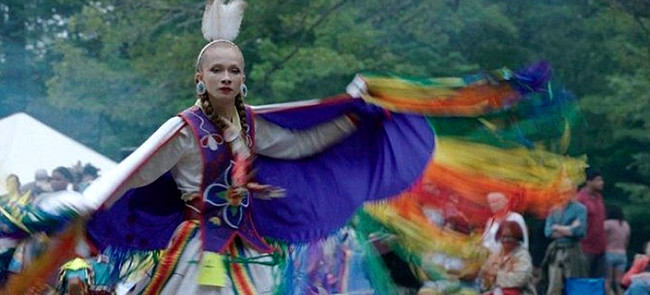 From French filmmaker Stephanie Lamorre, this perceptive documentary profiles a young Native American dancer who has lived much of his life as an outsider. But his family knows that he's an integral, inspiring member of the tribe. The film's intimate, observational approach allows the viewer to identify with these people. It's an impressive depiction of the culture, as well as a powerful exploration of a range of urgent themes. A member of the Narragansett tribe in Rhode Island, Sherente is a two-spirited 17-year-old, identifying as both male and female and happy to be referred to using any pronoun. He understands that ideas of masculinity and femininity are based in culture, and vary around the world. Supported by his family, he embraces his body, happy to live outside societal standards without the need for medical intervention. And despite opposition Sherente has become a respected participant in a pow-wow dance traditionally reserved for women. Unapologetically, he decorates his ornate shawl with the rainbow colours of inclusivity. The title refers to how thunder marks the clash of two fronts coming together. Without making anything obvious, the film quietly reveals how the tenacious young Sherente has stood up to the tribe's resistance to his assertion of his identity. He gently reminds them that two-spirited people are part of their ancient traditions, which have been muted by 400 years of colonisation. And members of the tribe also discuss how children were taken from indigenous families to be indoctrinated in European culture. Then in a key brief moment, Sherente shows himself adept at vogueing as well. Emerging beyond both expectations and bigotry, Sherente has had a hugely positive impact beyond his community. He's visited by people from other cultures who express how his approach has changed perceptions, opening minds to the true breadth of human sexuality. And his parents and siblings are amazing, notably in a scene in which they all cheer him on as he applies to top universities. Lamorre captures these moments with unobtrusive fly-on-the-wall camerawork and fluid editing, Lamorre weaves in terrific home movies from Sherente's childhood, footage of his tribal dance performances, family gatherings and other events. With its compelling narrative and unfiltered documentary footage, this film is a rare look into a Native American culture, revealing a complex mixture of warm acceptance and prejudice within a group that has itself been cruelly marginalised for centuries. Sherente believes it's important to see "the spectrum that exists in all of creation", because unity is the source of strength. This is a vitally hopeful film about the importance of letting people be themselves so that they can become the leaders we need.
| | |||
|
The Crime of the Century Review by Rich Cline | 
| |||||
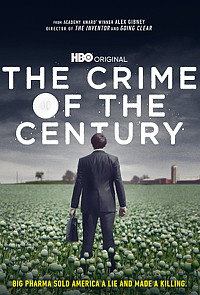 dir-scr Alex Gibney prd Alex Gibney, Sarah Dowland, Svetlana Zill with Patrick Radden Keefe, Barry Meier, Scott Higham, Lenny Bernstein, Joe Rannazzisi, Alec Burlakoff, Mark Ross , Anna Lembke, Sunrise Lee, Lynn Webster, Jonathan Novak, Fred Wyshak release US 11.May.21, UK 15.May.21 21/US HBO 3h51 Now streaming... |
 Taking an in-depth look at the opioid crisis, filmmaker Alex Gibney pulls no punches with this two-part documentary, opening with a police raid as someone dies, then revealing new evidence to prove how the entire situation is actually a criminal action carefully planned by businesses looking for profits. Expertly shot and edited, the longer format allows Gibney to include eye-opening details that keep the film entertaining and emotionally powerful. Powerfully, the film highlights specific case histories while interviewing and experts who focus on the human cost of opioid addiction. Many sequences are harrowing to watch, documenting deep-seated fraud and abuse of the system, including the deliberate marketing of drugs to children and a callous attitude toward how addiction destroys working-class families. Along the way, it's deeply chilling to see the rampantly immoral actions of Big Pharma and the doctors and officials they bribe. Over the years, they have dissembled and manipulated investigations and warped the legal framework, using cartel-like actions to profit from pain. Early on, Gibney goes back in history to provide some vivid context, exploring the enormous impact of opium throughout human history, eventually leading to a close connection between criminal drug kingpins and multinational pharmaceuticals. The industry hinges on developing and cultivating addiction to maximise income, so the Sackler family and Purdue Pharma became the biggest heroin pushers in the world. Pharmaceutical companies knew from the outset that opioids were inherently deadly, yet they aggressively turned them into a billion-dollar industry, blaming victims for a crisis they deliberately created. And when government agencies saw what they were doing, they used lobbying and bribery to get the laws changed and escape justice. Through all of this, they have lied blatantly about the dangers of pain-killers like oxycodone, which is literally heroin in tablet form, or the synthetic version fentanyl. The film is expertly structured to continually deepen the story while exploring one shocking fact after another using a mix of interviews, archive footage and fly-on-the wall situations, including some tense police raids. It's a massively complex story, with layers, twists and revelations. Thankfully, the film also follows federal agents and journalists as they tenaciously take on the problem from various sides, fighting "the offence of greed". The truth is that pharmaceutical companies are great at getting people onto a drug regime, and they certainly don't care about helping people get clean.
| ||||
|
Hating Peter Tatchell Review by Rich Cline | 
| |||||
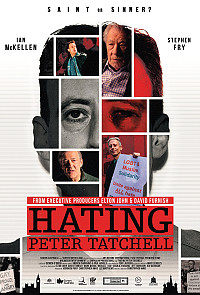 dir-scr Christopher Amos prd Veronica Fury, Christopher Amos, Lee Matthews with Peter Tatchell, Ian McKellen, Stephen Fry, Chris Smith, George Carey, Helen Hill, Angela Mason, Adrian Arbib, Heather Kniese, Mardi Nitsche, Tom Robinson, Elton John release US/UK 20.May.21 21/Australia Netflix 1h31 Now streaming... |
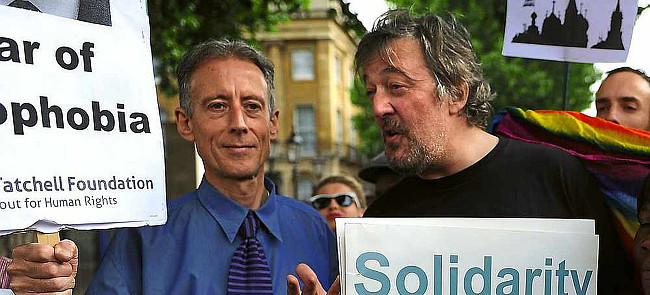 Quick-paced and packed with terrific footage, this documentary traces the life and work of someone who's been called the most disliked man in Britain. Australian-born Peter Tatchell has unapologetically pursued justice on human rights issues, using civil disobedience to protest against wars, oppressive regimes and inequality based on race, gender and sexuality. This is a riveting, intimate, remarkably balanced film that carries a series of urgent kicks. Raised in a fundamentalist Christian home in Melbourne, Tatchell was told that he was condemned by God due to his sexuality. This fuelled his political rebellions at school, later bravely standing up to violent riot police. Moving to London at age 19 in 1971, he became a pioneer in the fight for LGBT+ rights worldwide, making front-page news due to actions on everything from the Vietnam War to Robert Mugabe to Putin's Russia. "We tried to play by the rules, but it hasn't worked," he says. "Now we have to break the rules." Centred around a warm, knowing conversation between Tatchell and McKellen, the film interweaves remarkable documentary footage and photographs to tell Tatchell's story chronologically. There are also terrific film and TV clips, plus new interviews that build a complex portrait of a man who unleashes outrageous protests in the face of injustice, refusing to accept the unfair status quo. His friend Fry calls him a performance artist who achieves maximum impact. Filmmaker Amos' crew accompanies him on several missions. As groundbreaking cabinet minister Smith says, Tatchell has often been an irritant, but that's a good thing. At every step, Tatchell has faced death threats and violent bigotry, but he has remained at the forefront of almost every major rights movement in the past half-century. The documentary rightfully centres on his work in the LGBT+ community, as he repeatedly wins battles to make the system fairer. And it grapples with the morality of how he self-righteously outed people he saw as hypocrites, as well as some of his more deliberately provocative activities. Amos keeps the tone upbeat, focussing on Tatchell's bold, often heroically courageous approach to what he sees as a moral obligation. But it also taps into darker elements of his story, including emotional scenes with his family, physical attacks and times when Tatchell poured fuel onto controversy. It's inspiring to see his creative responses to the frustrating way prejudice and lies so often win out over tolerance and truth. And he's still going strong, unafraid to stand up to bullies and tyrants wherever he finds them.
| ||||

See also: SHADOWS FILM FESTIVAL © 2021 by Rich Cline, Shadows
on the Wall
HOME | REVIEWS | NEWS | FESTIVAL | AWARDS
| Q&A | ABOUT | TALKBACK | | ||||

